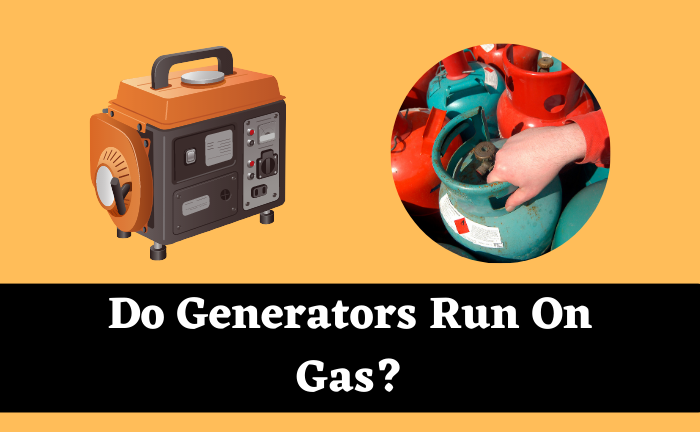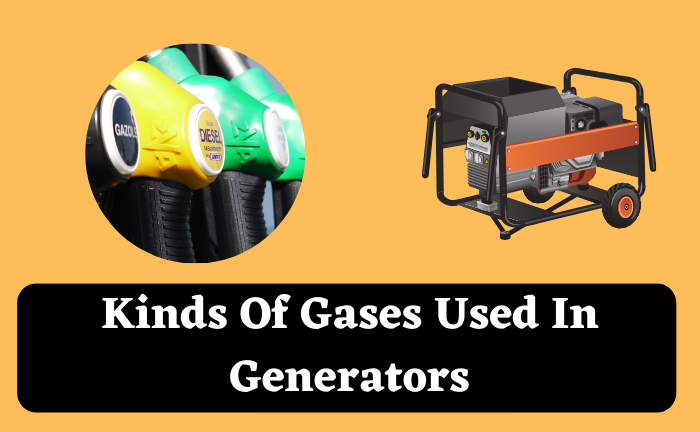A power outage can be struck anytime; therefore, having a generator handy is a great convenience. Generators were a valuable tool for the occasional outage; however, ongoing climate crises have led to continuous power outages. People look for efficient generators that give incredible output to avoid constant disruption between operations. And to obtain efficiency, generators require the right fuel.
Generators run on several fuels, and gas is the most convenient among them. It keeps your home powered up for continuous hours without interrupting operations. So to answer your question, yes, generators run on gas. Next, we’ll talk about all the insight factors about gas in generators, so read till the end.
Table of Contents
Do Generators Run On Gas?

Yes, generators run on several fuel types, and gas is among them. Moreover, gas is the most affordable fuel that maximizes power efficiency at a minimal cost. Of all the other options, gas burns slowly and keeps the generator running for hours. So if you face continuous power outages and are looking to rely on something durable, then gas is your ideal choice.
Kinds Of Gases Used In Generators

You have several options when it comes to using gas in generators. So don’t confuse with only one type. Here are some of them.
Natural Gas
The first type on our hands is natural gas. Natural gas is the most suitable option for those who have gas pipes installed in their homes. Otherwise, there is no reliable source to store natural gas. Natural gas is cheaper than other fuels, yet it is not entirely eco-friendly. Moreover, it takes a little extra time while starting the generator, which causes unnecessary delays in operations.
Propane Gas
The next gas we have on hand is propane gas, the most widely used fuel in America. Propane gas, also known as liquefied gas or LPG, is ideal for generators installed in remote areas. Propane gas is suitable for every home, and appliances can be light on it quickly.
Gasoline
Even though gas generators are affordable and durable, they could sometimes be complicated. Generators, if based on gasoline, could have a hard time for its user in finding it because gasoline is difficult to get in some areas.
Diesel
The last we have on the list is diesel. Diesel is the most durable option that burns the fuels slowly and keeps the generator running for hours. Contrary to the reliability, diesel is the least eco-friendly fuel as it has a higher emission level that pollutes the environment.
Pros And Cons Gas In Generators
Although it seems like an excellent option to run the generator on gas, it would be better if you evaluate its both positive and negative first. Check them out as follows.
Pros:
- When utilized to power homes and businesses, it helps to minimize expenditures.
- Because it is distributed directly through pipes, it is readily available in major cities.
- There is no need to be concerned about gasoline storage.
- Cleaner than other types of fuel.
- Cheaper than other nonrenewable fuels.
- Extremely effective.
- Lower sulfur, nitrogen, and carbon dioxide emissions as compared to oil and coal
- One of the most environmentally friendly fossil fuels.
- Unlike generators fueled by oil or diesel, there are no offensive smells.
Cons:
- Increase the production of carbon dioxide, a greenhouse gas.
- It is a finite or nonrenewable source of energy.
- Natural gas supply is affected during natural disasters, resulting in fuel scarcity when you need it the most. This is because it is delivered via gas pipes.
- Extremely explosive, posing a significant fire risk if the pipeline explodes.
- When compared to diesel generators, they are more expensive to run.
What Factors Influence Generator Gas Consumption Rates?
Gas consumption rates rely on two factors as follows
- Load Consumption
- Generator Type
Load Consumption
So first thing first, the gas consumption ratio depends on the load applied to the generator. Load means several appliances connected to the generator; if you run heavy machines on your generator, the gas is bound to consume quickly.
Personal electronics are a small load, whereas a complete home is a big one. It is critical to consider what you want to be able to run if there is a power outage. What generator size do I require?
When you look at generator ads, you’ll notice that they usually provide data based on a 50% load.
Consider its consumption with a full load if you know you’ll be utilizing more than half of its available power.
Hence, if you want to run your generator for a long duration, put less load on it.
Generator Type
The next factor regarding gas consumption is generator type. There are several generator types available in the market with multiple variants. Each of these variants and models has different models. Let’s explore them as well.
Portable generators
If you enjoy traveling, you’ve probably considered portable generators since they’re tiny, practical, and straightforward. Depending on the size of the generator, it may accomplish duties as simple as charging a laptop to as complex as powering appliances.
The Fuel Tank Capacity shows how much fuel the tank can contain. A significant capacity tank allows the generator to function for extended periods without refueling.
Most homes, however, cannot rely on portable generators because they can only power a few items simultaneously.
Standby Generators
A standby generator’s principal role is to keep you safe in an emergency. It often packs such a tremendous punch that it may power your complete home for several hours in a row. A standby generator might be pretty helpful if you live near adverse weather.
However, due to its massive size, it is guaranteed to waste a lot of gas as it handles heavy loads.
Tri-Fuel Generator
A tri-fuel generator is your best choice if you want the most extraordinary adaptability from your generator. As the name implies, these generators allow you to use natural gas, liquid propane, or gasoline as fuel.
There are also kits available to assist you in converting your existing gas-powered generator to a tri-fuel generator.
How Much 5000 Watt Generator Consumer Gas Per Hour?
If you’re operating survival equipment, a 5000 watt generator may burn 0.75 gallons of gas every hour.
On a full load, a giant machine, such as a 30-kilowatt model, can consume up to three gallons per hour.
Is a Gas Generator Safe To Use?
Even though generators running on gas could be the most convenient decision, you could make, however, gas generators are safer than others. Gas is comparatively more explosive and dangerous than other fuels. Moreover, the fumes released by gas are hazardous and cause several breathing problems.
But if used correctly, gas generators are less expensive and easy to maintain. For better handling, ensure you have gas pipes installed in your homes to store gas for a long time.
Wrapping Up
Power outages have become a routine now in every season and causes a great inconvenience to carry out work. To avoid unnecessary delay, having a generator in hand is a must.
Yes, gas generators are efficient and more productive than others. A gas generator is ideal if you’re tight on budget and looking for long-term relief against power outages.
I hope this article has been proving helpful to you.

